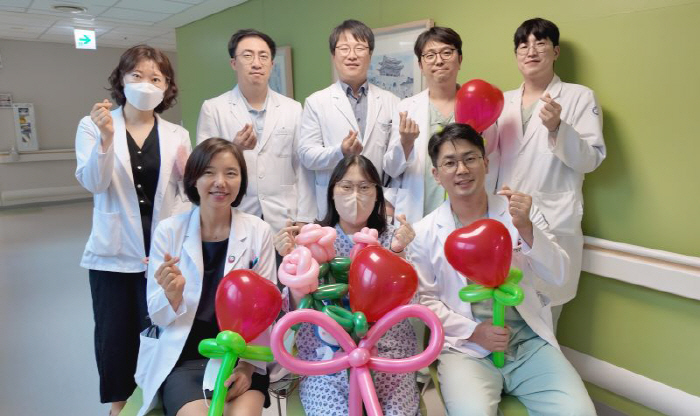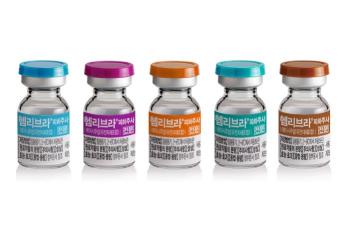The nurse who found heart disease while pregnant...Overcoming 1% chance of survival, giving birth to twins without a hitch
Sep 02, 2025
|
A (32, female), a nurse at Bucheon Sejong Hospital, has been on leave before giving birth and has been treated at an obstetrics and gynecology clinic near her home (Incheon).
After pregnancy, the symptoms of breathing continued, but I endured it because I had twins, considering that I was a little more out of breath than other mothers.
There was no health problem, so I didn't even think about performing echocardiography before and after pregnancy.
Even in obstetrics and gynecology, it was only a symptom of multiple pregnancy. Then, in May, the symptoms of breathing worsened.
I couldn't even lie down because I couldn't breathe, and I felt stuffed as if I had an upset stomach.
As A entered the 32nd week of pregnancy, a local obstetrician recommended treatment at a university hospital in Incheon.
◇'1% chance of survival' to overcome and give birth to twins without any problems
The medical results were shocking. The diagnostic name was 'perinatal cardiomyopathy (post-delivery cardiomyopathy)', and echocardiography showed severe heart failure with only about 15% of cardiac function (EF). Medical staff determined that heart transplants were also necessary.
Mr. A gave birth to twins by emergency cesarean section as soon as possible, and the struggle has continued since then.
Mr. A developed cardiac shock immediately after giving birth, so he applied an extracorporeal circulator (ECMO). Cardiac shock accompanied a large amount of hemoptysis, and a large amount of blood became a blood clot in A's left lung bronchial tubes, interfering with breathing function.
The family, who heard the explanation of the possibility of death from the medical staff, wanted to be transferred to Sejong Hospital, which is A's workplace and is also famous for heart transplantation, and Kim Kyung-hee, head of the heart transplant center at Sejong Hospital in Incheon, visited the hospital where A was, checked the patient's condition, and immediately transferred him to Sejong Hospital in Incheon.
After that, A went through a full-fledged heart transplant process, such as registering as a waiting patient for transplantation. However, the waiting process was not smooth.
Bronchoscopy and anticoagulant drug therapy are performed twice a day to remove blood clots in the lung bronchial tubes, and if the lung function is poor, heart transplantation is impossible, so tracheostomy was performed to restore lung function.
In all processes, medical staff from the department of cardiology, cardiovascular thoracic surgery, obstetrics and gynecology, respiratory medicine, and intensive care medicine at Incheon Sejong Hospital conducted close cooperation to keep A. After holding out for about 15 days, a heart donor appeared. A had a high antibody value for transplant immunity after several blood transfusions due to childbirth and cardiac shock, but there was not much time given to A to lower the antibody value and transplant.
Accordingly, the medical staff of Incheon Sejong Hospital decided to perform heart transplantation immediately after treatment with high-dose immunosuppressant drugs. And finally the operation was successful. The transplant rejection, which was feared, did not occur. A was treated for dialysis due to kidney function, which had been poor even before surgery, but was recently discharged safely and reunited with his twin children. Currently, both the mother and twin children are said to be in good health.
Mr. A said "The doctor's opinion notified to me and my family before the surgery was '1% survival". But there was definitely a place where I could achieve that 1% miracle"Thank you to all the medical staff. I hope those who have raised their hopes in diseases and situations like mine will not lose hope and find a new life at Sejong Hospital, where they can achieve miracles."
◇What is 'perinatal cardiomyopathy' ?
On the other hand, experts emphasize that the sudden deterioration of the heart condition to the extent that a healthy mother had a heart transplant, and that they should be alert to the 'postpartum cardiomyopathy (postpartum cardiomyopathy)'.
Physiological changes that occur during pregnancy have many effects on the cardiovascular system.
The average pregnant woman is a relatively young and healthy woman, and most of them have no special abnormalities in the cardiovascular system until pregnancy, so it is easy to neglect cardiovascular examination.
In addition, most pregnant women suffer from fatigue, decreased motor skills, and difficulty breathing as they enter the second half of pregnancy, and even though they were heart failure symptoms, they are often misunderstood as a natural reaction by pregnancy and do not receive treatment, making it difficult to diagnose early.
During pregnancy, the amount of blood increases, resulting in a 30-50% increase in cardiac output. Increased cardiac output can lead to heart failure in women with existing cardiovascular diseases. Pregnancy also causes new cardiovascular diseases in women who did not have cardiovascular diseases.
Perinatal cardiomyopathy (Post-delivery cardiomyopathy) is a pregnancy complication that occurs from the last 1 month of pregnancy to within 5 months of delivery. There is no ischemic disease or valve disease, and ventricular dilatation and decreased contractile function are accompanied. Although similar in form to dilated cardiomyopathy, it appears in women in a specific period of time and is therefore classified as a different disease. Risk factors for perinatal cardiomyopathy include multiple births, prenatal birth, hypertension, and genetic factors. The cause of the disease is not clear, but it is known that the interrelationship between changes in the immune system and hemodynamic changes due to pregnancy is one of the important factors.
It is a disease that appears suddenly and is more embarrassing, but natural recovery is possible if it is dealt with in time. About 50% of heart function is normalized within six months of the onset.
However, if it is diagnosed only 6 months after the onset, the possibility of natural recovery is very low, and severe left ventricular function decline occurs. In addition, if the left ventricle is too stretched to the point that the diameter (diameter) is more than 60mm at the end of the left ventricular diastolic phase (when the left ventricle is most relaxed), the possibility of natural recovery decreases. Heart transplants are sometimes considered if the treatment effect decreases and symptoms persist and the administration of psychosomatic drugs is necessary.
Kim Kyung-hee, Director of the Cardiac Transplantation Center at Sejong Hospital in Incheon, said "Pregnant cardiomyopathy patients should be prohibited from getting pregnant later if their left ventricular systolic function is not normalized.""Even if the systolic function returns to normal and pregnancy and delivery are possible, detailed observation is needed during pregnancy and recurrence of heart failure should also be considered." he advised.
This article was translated by Naver AI translator.














